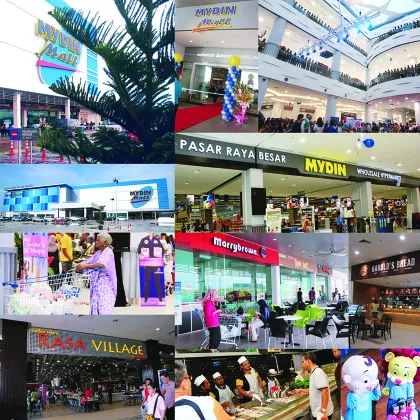
IT in Retail: Competing smartly with IT
Malaysian retailers are keenly aware of the value of information technology. Prakash Sakti finds out how IT is used to boost the competitive advantage of Mydin and 7-Eleven.
Retailing in Malaysia is a highly competitive business.
Last year, the Malaysian retail industry expanded by 4.5% to RM91.7 billion (US$28.4 billion) in total turnover. This year, the industry is expected to see overall growth of 6%, according to the Retail Group Malaysia, a retail consulting firm.
Although the sector sees signs of positive growth including an increase in foreign tourist receipts, retailers continue to be challenged by rising costs, intensified competition, an over-supply of retail space as well as expectations of a slower economy.
The number of retailers as well as shopping malls has increased rapidly in the past few years. Retailers have had to compete fiercely to attract consumers who are more cautious with their spending due to the rise in prices of products and services.
To stay competitive, many retail players in Malaysia are turning to various strategies to fight for the hearts and minds of consumers. One of the top retailers in the country, Giant hypermarket will launch its own radio station next month, with plans to broadcast to all its 128 retail outlets nationwide. The broadcast channel will feature selections of local and international music, info-commercials, shout-outs and promotions.
Increased competition from online retailers and the entry of international brand retailers has also forced local players to up their game. To attract customers back to the stores, more brick-and-mortar retailers are offering in-store Wi-Fi, interactive websites, tablet-equipped sales staff and self-service kiosks – all to create better shopping experiences and to satisfy customers that they are empowered with information and they can research and buy at their own pace.
More Malaysian retailers are now also using advanced IT solutions in their operational and transactional systems such as merchandise management to better understand customer buying behaviour. The aim is to get help to boost sales and revenue, while reducing operational costs.
Mydin Mohamed Holdings Berhad (Mydin) and 7-Eleven Malaysia are among a growing number of local retailers who have paid attention to IT to gain a competitive business advantage.
Centralised management at Mydin
Mydin is one of Malaysia’s biggest hypermarket operators. From a single store selling toys in 1956, it now has more than 200 outlets throughout the country, including 13 wholesale hypermarkets. Mydin has more than 10,000 employees and generates annual revenues of RM2.6 billion.
The company maintained that one of its critical factors of success over the years is its ability to provide quality products to customers at a low price through direct purchase from manufacturers.
With tens of thousands of products and hundreds of outlets to manage, Mydin acknowledged the importance of boosting its IT infrastructure to maximisebusiness operations and efficiency.
Its Information Technology Director, Malik Murad Ali, said in their bid to deliver better products and services to customers, Mydinrealised early on the need for a robust technology platform. So in 2001, Mydin implemented its first centralised Enterprise Resource Planning (ERP) system.
Among the various solutions in place now are Citrix XenServer and Citrix XenApp which are being used to consolidate and standardise its business applications. Malik said with these technologies, the company is able to provide on-demand application access to all employees.
With Citrix Access Gateway delivering Mydin’s applications over the Internet, its executives are able to enjoy secure access to corporate applications while they are overseas on business sourcing trips.
Applications are virtualised from the company’s data centre in Subang Jaya, and the centralised network supports over 3,000 user IDs.
“As most of our users are not IT-savvy people, the Citrix solution is perfect as it is intuitive, easy to use and requires minimal training,” said Malik.
Among the key benefits of using the Citrix systems are improved application availability and access, greatly reduced software upgrade time from 120 man-hours to 15 minutes, simplified management of multiple application identities and passwords.
With a good IT infrastructure, systems upgrading was easy. In 2013, Mydin took just two and a half weeks to deploy a cloud-based point of sale (POS) solution across 25 stores. Malik said without such technology, similar projects would have taken between three and six months.
He added that in fact, Mydin’s mini market model is entirely built on its cloud-based point of sale system. The POS feature is developed by Malaysian firm Xilnex and offers customer and service management, inventory control, services tracking and integrated marketing tools.
Malik said in time to come the company expects more applications to be moved to the cloud.
More recently, Mydin has also engaged JDA Software Group, Inc., the supply chain company, to implement several space and floor planning solutions from the JDA Space and Category Management suite.
The solutions, including JDA Space Planning, JDA Floor Planning, JDA Space Automation and JDA Intactix Knowledge Base, were chosen to streamline existing space management processes leveraging industry best practices and automation.
IT upgrade at 7-Eleven
Convenience store operator, 7-Eleven Malaysia is planning to upgrade its IT system and build a combined distribution centre to service its outlets.
Managing director Ho Meng shared that the company would be allocating RM66.3 million over the next three years for these expansion plans. A huge portion of the sum would be used to upgrade current systems ahead of the Goods and Services Tax (GST) that will be implemented in Malaysia in April 2015.
Ho said the improvement in IT infrastructure would help to improve the company’s efficiency and productivity.
7-Eleven Malaysia, controlled by tycoon Tan Sri Vincent Tan, is the largest convenience store operator in Malaysia with 1,583 stores and a market share of 82%. The improvement in IT system is deemed necessary as the company plans to add utility bill payment and e-commerce facilities for online purchases. It also aims to improve its product mix and launch more sophisticated bundling promotions to boost sales.
In May this year, 7-Eleven rolled out Touch ‘n Go reload services at all its outlets. It also intends to enable Touch ‘n Go as a payment option at all its outlets by the end of the year. Touch ‘n Go is a prepaid electronic cash card widely used in Malaysia for payment of road tolls, parking, public transport services and cashless payment at retail outlets.
To further enhance its ability to attract customers, the company has entered into a joint distribution agreement with Incomm for the rollout of Posa gift cards. 7-Eleven Malaysia is the first convenience store chain in Southeast Asia to sign with payment service provider MOL and Incomm to roll out Posa gift cards.
Ho said 7-Eleven is keen to look at various IT-enabled solution platforms to attract customers to its stores, especially with statistics showing that commission income on mobile phone and online gaming reloads can potentially make up 3% to 4% of revenue. These products enjoy high gross margins of as much as 100%.
Homegrown smartphone app
Even as retailers are looking for solutions, new service providers have also been proactive and knocking on their doors.
PUC Founder (MSC) Bhd has developed a new application called Shopinfo, tailored for retailers in Malaysia.
PUC Founder group managing director Cheong Chia Chieh said the smartphone app, which is based on China Shopinfo, will provide information on shopping locations and promotions from merchants.
“It’s designed to push people offline and get them to visit malls and shops, as well as promote tourism in both Malaysia and China. End-users can download the app for free while merchants can list their services on the platform or customise the app accordingly,” he said.
PUC Founder will collaborate with China-based Xinze Media Group to launch Shopinfo in the coming months. Cheong said under the joint venture agreement with Xinze, app users in China will gain access to the promotions and offers made by Malaysian shops and businesses, while Malaysian app users can also access the Chinese retailers’ offers.
According to him, an initial 150 malls in the Klang Valley will be included in Shopinfo’s listing when it is launched.
China Shopinfo has been in use for the past year in China, where there are more than 500 million smartphone users.



















 Advertise
Advertise





